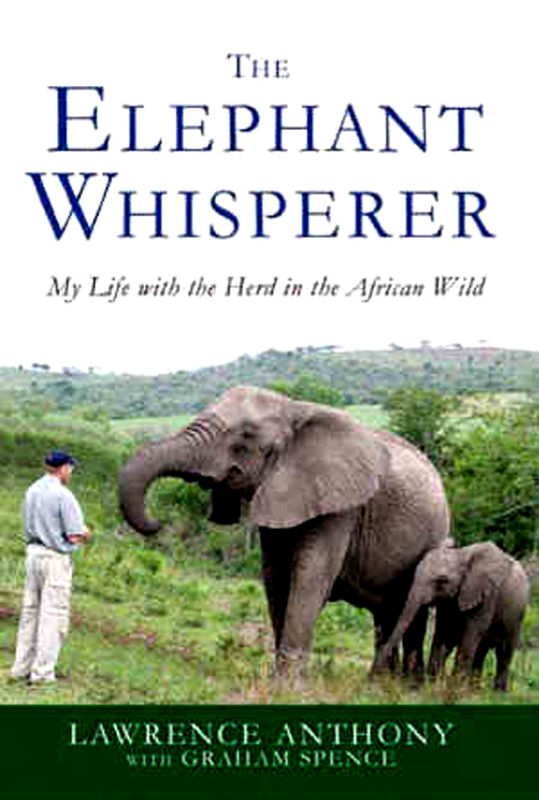Elephants Journey to Pay Respect...But How Did they Know?
Oct 1, 2017 17:54:54 #
Elephants Journey to Pay Respect...But How Did they Know?
In March of 2012, for 12 hours, two herds of wild South African elephants slowly made their way through the Zululand bush until they reached the house of late author Lawrence Anthony, the conservationist who had saved their lives.
The formerly violent, rogue elephants, destined to be shot a few years ago as pests, had been rescued and rehabilitated by Anthony, who had grown up in the bush and was known as the âElephant Whisperer.â
For two days the herds loitered at Anthonyâs rural compound on the vast Thula Thula game reserve â to say good-bye to the man they loved. But how did they know he had died March 7?
Known for his unique ability to calm traumatized elephants, Anthony had become a legend. He is the author of three books, Baghdad Ark, detailing his efforts to rescue the animals at Baghdad Zoo during the Iraqi war, the forthcoming The Last Rhinos, and his bestselling The Elephant Whisperer.
There are two elephant herds at Thula Thula. According to his son Dylan, both arrived at the Anthony family compound shortly after the authorâs death.
âThey had not visited the house for a year and a half and it must have taken them about 12 hours to make the journey,â Dylan is quoted in various local news accounts. âThe first herd arrived on Sunday and the second herd, a day later. They all hung around for about two days before making their way back into the bush.â
Elephants have long been known to mourn their dead. In India, baby elephants often are raised with a boy who will be their lifelong âmahout.â The pair develop legendary bonds â and it is not uncommon for one to waste away without a will to live after the death of the other.
But these are wild elephants in the 21st century, not some Rudyard Kipling novel.
The first herd to arrive at Thula Thula several years ago were violent. They hated humans. Anthony found himself fighting a desperate battle for their survival and their trust, which he detailed in The Elephant Whisperer:
It was 4:45 a.m. and I was standing in front of Nana, an enraged wild elephant, pleading with her in desperation. Both our lives depended on it. The only thing separating us was an 8,000-volt electric fence that she was preparing to flatten and make her escape.
Nana, the matriarch of her herd, tensed her enormous frame and flared her ears.
âDonât do it, Nana,â I said, as calmly as I could. She stood there, motionless but tense. The rest of the herd froze.
âThis is your home now,â I continued. âPlease donât do it, girl.â
I felt her eyes boring into me.
ââTheyâll kill you all if you break out. This is your home now. You have no need to run any more.â
âSuddenly, the absurdity of the situation struck me,â Anthony writes. âHere I was in pitch darkness, talking to a wild female elephant with a baby, the most dangerous possible combination, as if we were having a friendly chat. But I meant every word. âYou will all die if you go. Stay here. I will be here with you and itâs a good place.â
âShe took another step forward. I could see her tense up again, preparing to snap the electric wire and be out, the rest of the herd smashing after her in a flash.
âI was in their path, and would only have seconds to scramble out of their way and climb the nearest tree. I wondered if I would be fast enough to avoid being trampled. Possibly not.
âThen something happened between Nana and me, some tiny spark of recognition, flaring for the briefest of moments. Then it was gone. Nana turned and melted into the bush. The rest of the herd followed. I couldnât explain what had happened between us, but it gave me the first glimmer-of hope since the elephants had first thundered into my life.â
It had all started several weeks earlier with a phone call from an elephant welfare organization. Would Anthony be interested in adopting a problem herd of wild elephants? They lived on a game reserve 600 miles away and were âtroublesome,â recalled Anthony.
âThey had a tendency to break out of reserves and the owners wanted to get rid of them fast. If we didnât take them, they would be shot.
âThe woman explained, âThe matriarch is an amazing escape artist and has worked out how to break through electric fences. She just twists the wire around her tusks until it snaps, or takes the pain and smashes through.â
ââWhy me?â I asked.
***********************************************
So, how after Anthony’s death, did the reserve’s elephants — grazing miles away in distant parts of the park — know?
“A good man died suddenly,” says Rabbi Leila Gal Berner, Ph.D., “and from miles and miles away, two herds of elephants, sensing that they had lost a beloved human friend, moved in a solemn, almost ‘funereal’ procession to make a call on the bereaved family at the deceased man’s home.”
“If there ever were a time, when we can truly sense the wondrous ‘interconnectedness of all beings,’ it is when we reflect on the elephants of Thula Thula. A man’s heart’s stops, and hundreds of elephants’ hearts are grieving. This man’s oh-so-abundantly loving heart offered healing to these elephants, and now, they came to pay loving homage to their friend.”
http://www.all-creatures.org/stories/a-elephants-journey-respect.html
In March of 2012, for 12 hours, two herds of wild South African elephants slowly made their way through the Zululand bush until they reached the house of late author Lawrence Anthony, the conservationist who had saved their lives.
The formerly violent, rogue elephants, destined to be shot a few years ago as pests, had been rescued and rehabilitated by Anthony, who had grown up in the bush and was known as the âElephant Whisperer.â
For two days the herds loitered at Anthonyâs rural compound on the vast Thula Thula game reserve â to say good-bye to the man they loved. But how did they know he had died March 7?
Known for his unique ability to calm traumatized elephants, Anthony had become a legend. He is the author of three books, Baghdad Ark, detailing his efforts to rescue the animals at Baghdad Zoo during the Iraqi war, the forthcoming The Last Rhinos, and his bestselling The Elephant Whisperer.
There are two elephant herds at Thula Thula. According to his son Dylan, both arrived at the Anthony family compound shortly after the authorâs death.
âThey had not visited the house for a year and a half and it must have taken them about 12 hours to make the journey,â Dylan is quoted in various local news accounts. âThe first herd arrived on Sunday and the second herd, a day later. They all hung around for about two days before making their way back into the bush.â
Elephants have long been known to mourn their dead. In India, baby elephants often are raised with a boy who will be their lifelong âmahout.â The pair develop legendary bonds â and it is not uncommon for one to waste away without a will to live after the death of the other.
But these are wild elephants in the 21st century, not some Rudyard Kipling novel.
The first herd to arrive at Thula Thula several years ago were violent. They hated humans. Anthony found himself fighting a desperate battle for their survival and their trust, which he detailed in The Elephant Whisperer:
It was 4:45 a.m. and I was standing in front of Nana, an enraged wild elephant, pleading with her in desperation. Both our lives depended on it. The only thing separating us was an 8,000-volt electric fence that she was preparing to flatten and make her escape.
Nana, the matriarch of her herd, tensed her enormous frame and flared her ears.
âDonât do it, Nana,â I said, as calmly as I could. She stood there, motionless but tense. The rest of the herd froze.
âThis is your home now,â I continued. âPlease donât do it, girl.â
I felt her eyes boring into me.
ââTheyâll kill you all if you break out. This is your home now. You have no need to run any more.â
âSuddenly, the absurdity of the situation struck me,â Anthony writes. âHere I was in pitch darkness, talking to a wild female elephant with a baby, the most dangerous possible combination, as if we were having a friendly chat. But I meant every word. âYou will all die if you go. Stay here. I will be here with you and itâs a good place.â
âShe took another step forward. I could see her tense up again, preparing to snap the electric wire and be out, the rest of the herd smashing after her in a flash.
âI was in their path, and would only have seconds to scramble out of their way and climb the nearest tree. I wondered if I would be fast enough to avoid being trampled. Possibly not.
âThen something happened between Nana and me, some tiny spark of recognition, flaring for the briefest of moments. Then it was gone. Nana turned and melted into the bush. The rest of the herd followed. I couldnât explain what had happened between us, but it gave me the first glimmer-of hope since the elephants had first thundered into my life.â
It had all started several weeks earlier with a phone call from an elephant welfare organization. Would Anthony be interested in adopting a problem herd of wild elephants? They lived on a game reserve 600 miles away and were âtroublesome,â recalled Anthony.
âThey had a tendency to break out of reserves and the owners wanted to get rid of them fast. If we didnât take them, they would be shot.
âThe woman explained, âThe matriarch is an amazing escape artist and has worked out how to break through electric fences. She just twists the wire around her tusks until it snaps, or takes the pain and smashes through.â
ââWhy me?â I asked.
***********************************************
So, how after Anthony’s death, did the reserve’s elephants — grazing miles away in distant parts of the park — know?
“A good man died suddenly,” says Rabbi Leila Gal Berner, Ph.D., “and from miles and miles away, two herds of elephants, sensing that they had lost a beloved human friend, moved in a solemn, almost ‘funereal’ procession to make a call on the bereaved family at the deceased man’s home.”
“If there ever were a time, when we can truly sense the wondrous ‘interconnectedness of all beings,’ it is when we reflect on the elephants of Thula Thula. A man’s heart’s stops, and hundreds of elephants’ hearts are grieving. This man’s oh-so-abundantly loving heart offered healing to these elephants, and now, they came to pay loving homage to their friend.”
http://www.all-creatures.org/stories/a-elephants-journey-respect.html

Oct 1, 2017 18:21:05 #
Iamdjchrys
Loc: Decatur, Texas
Oldsailor65 wrote:
b color=blue Elephants Journey to Pay Respect...... (show quote)
Beautiful true story, so needed in the midst of all of the suffering and turmoil going on in the world right now, not the least of which is our slow response to Americans in Puerto Rico.
Oct 1, 2017 19:46:24 #
Iamdjchrys wrote:
Beautiful true story, so needed in the midst of all of the suffering and turmoil going on in the world right now, not the least of which is our slow response to Americans in Puerto Rico.
=====================
A moving beautiful story. I think humans could learn from the elephants. Hope they are free and safe.
Oct 1, 2017 20:00:42 #
Radiance3 wrote:
=====================
A moving beautiful story. I think humans could learn from the elephants. Hope they are free and safe.
A moving beautiful story. I think humans could learn from the elephants. Hope they are free and safe.
*************************************************************
We do not need more people anyplace in the world.
Current problems are not due to Climate change or global warming.
Problems are due to too dammed many people destroying the habitat
of wild animals and killing them for their skin and other parts. One thing
that really pisses me off is the animal parts used in China and other Asian
countries just so men can get an erection.
I love animals and get along with them better than I do people.
Oct 1, 2017 20:59:43 #
Iamdjchrys
Loc: Decatur, Texas
Oldsailor65 wrote:
**************************************************... (show quote)
I'm with you on this one!
Oct 2, 2017 16:54:06 #
Oct 3, 2017 11:17:00 #
Iamdjchrys wrote:
Beautiful true story, so needed in the midst of all of the suffering and turmoil going on in the world right now, not the least of which is our slow response to Americans in Puerto Rico.
I see. you are just taking what the lame stream media is telling you. I guess you did not see all of the water stacked up behind the Mayor and the dock filled with trailer loads of food and supplies. It is not the fault of the administration that those trailers are still on the dock. Where are all of the truck drivers that had been in San Juan before the hurricanes. It seems like there is a political battle going on in Puerto Rico.
Oct 3, 2017 11:30:50 #
Louie27 wrote:
I see. you are just taking what the lame stream media is telling you. I guess you did not see all of the water stacked up behind the Mayor and the dock filled with trailer loads of food and supplies. It is not the fault of the administration that those trailers are still on the dock. Where are all of the truck drivers that had been in San Juan before the hurricanes. It seems like there is a political battle going on in Puerto Rico.
********************************************************************
You just posted this reply to the wrong story!!!
Oct 3, 2017 12:19:21 #
Oldsailor65 wrote:
********************************************************************
You just posted this reply to the wrong story!!!
You just posted this reply to the wrong story!!!
Sorry old sailor! Must have been reading to many posts and got off track.

If you want to reply, then register here. Registration is free and your account is created instantly, so you can post right away.



